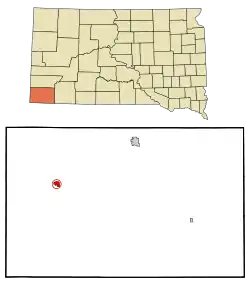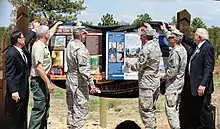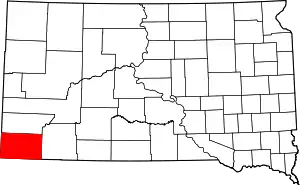Edgemont, South Dakota
Edgemont is a city in Fall River County, South Dakota, United States. The population was 774 at the 2010 census. The city lies on the far southern edge of the Black Hills in southwestern South Dakota.
Edgemont | |
|---|---|
| Edgemont, South Dakota | |
 Edgemont City Hall, August 2017 | |
| Motto(s): "To The Black Hills" | |
 Location in Fall River County and the state of South Dakota | |
| Coordinates: 43°17′58″N 103°49′44″W | |
| Country | United States |
| State | South Dakota |
| County | Fall River |
| Incorporated | 1895[1] |
| Area | |
| • Total | 1.38 sq mi (3.58 km2) |
| • Land | 1.38 sq mi (3.58 km2) |
| • Water | 0.00 sq mi (0.00 km2) |
| Elevation | 3,458 ft (1,054 m) |
| Population | |
| • Total | 774 |
| • Estimate (2019)[4] | 719 |
| • Density | 520.26/sq mi (200.83/km2) |
| Time zone | UTC-7 (Mountain (MST)) |
| • Summer (DST) | UTC-6 (MDT) |
| ZIP code | 57735 |
| Area code(s) | 605 |
| FIPS code | 46-18300[5] |
| GNIS feature ID | 1266810[6] |
| Website | City of Edgemont |
Edgemont is a crew change point for BNSF freight trains in the Gillette, Wyoming-Alliance, Nebraska division.[7]
History

Edgemont had its start in 1890 with the building of the Burlington Railroad through that territory.[8]
In 2012, the White Draw Fire burned eight miles northeast of Edgemont.[9] On July 1, 2012, an airplane fighting the fire crashed near town, killing four military personnel and injuring two.[10]
On the morning of January 17, 2017, a BNSF Railway westbound train struck and killed two roadway workers, including the watchman/lookout. The accident occurred at milepost 477, on the Black Hills subdivision, in Edgemont.[11]
Geography
Edgemont is located at 43°17′58″N 103°49′44″W (43.299453, -103.828966).[12]
According to the United States Census Bureau, the city has a total area of 0.97 square miles (2.51 km2), all land.[13]
The city lies at the intersection of US Highway 18 and South Dakota Highway 471. Its closest neighbors are Burdock and Dewey to the northwest, Hot Springs to the northeast, and Provo and Rumford to the south.
Edgemont lies just to the south of the Elk Mountains, a small range that is part of the Black Hills.
Climate
| Climate data for Edgemont, South Dakota | |||||||||||||
|---|---|---|---|---|---|---|---|---|---|---|---|---|---|
| Month | Jan | Feb | Mar | Apr | May | Jun | Jul | Aug | Sep | Oct | Nov | Dec | Year |
| Record high °F (°C) | 68 (20) |
69 (21) |
82 (28) |
92 (33) |
97 (36) |
104 (40) |
107 (42) |
105 (41) |
100 (38) |
91 (33) |
80 (27) |
70 (21) |
107 (42) |
| Average high °F (°C) | 37 (3) |
41 (5) |
52 (11) |
62 (17) |
71 (22) |
82 (28) |
91 (33) |
90 (32) |
79 (26) |
64 (18) |
48 (9) |
36 (2) |
63 (17) |
| Average low °F (°C) | 9 (−13) |
13 (−11) |
23 (−5) |
32 (0) |
43 (6) |
52 (11) |
59 (15) |
57 (14) |
45 (7) |
33 (1) |
19 (−7) |
9 (−13) |
33 (0) |
| Record low °F (°C) | −31 (−35) |
−34 (−37) |
−24 (−31) |
7 (−14) |
19 (−7) |
32 (0) |
42 (6) |
37 (3) |
8 (−13) |
−10 (−23) |
−17 (−27) |
−40 (−40) |
−40 (−40) |
| Average precipitation inches (mm) | 0.32 (8.1) |
0.52 (13) |
1.04 (26) |
1.90 (48) |
2.49 (63) |
2.59 (66) |
2.21 (56) |
1.53 (39) |
1.34 (34) |
1.33 (34) |
0.67 (17) |
0.41 (10) |
16.35 (415) |
| Source: The Weather Channel (Historical Monthly Averages) [14] | |||||||||||||
Education
Edgemont Public Schools are part of the Edgemont School District. The district has one elementary school and one high school. Students attend Edgemont High School.
Demographics
| Historical population | |||
|---|---|---|---|
| Census | Pop. | %± | |
| 1900 | 479 | — | |
| 1910 | 816 | 70.4% | |
| 1920 | 1,254 | 53.7% | |
| 1930 | 1,103 | −12.0% | |
| 1940 | 1,002 | −9.2% | |
| 1950 | 1,158 | 15.6% | |
| 1960 | 1,772 | 53.0% | |
| 1970 | 1,174 | −33.7% | |
| 1980 | 1,468 | 25.0% | |
| 1990 | 906 | −38.3% | |
| 2000 | 867 | −4.3% | |
| 2010 | 774 | −10.7% | |
| 2019 (est.) | 719 | [4] | −7.1% |
| U.S. Decennial Census[15] | |||
2010 census
As of the census[3] of 2010, there were 774 people, 386 households, and 201 families living in the city. The population density was 797.9 inhabitants per square mile (308.1/km2). There were 509 housing units at an average density of 524.7 per square mile (202.6/km2). The racial makeup of the city was 92.1% White, 0.1% African American, 3.4% Native American, 0.3% from other races, and 4.1% from two or more races. Hispanic or Latino of any race were 2.1% of the population.
There were 386 households, of which 18.9% had children under the age of 18 living with them, 41.5% were married couples living together, 7.0% had a female householder with no husband present, 3.6% had a male householder with no wife present, and 47.9% were non-families. 42.2% of all households were made up of individuals, and 21.7% had someone living alone who was 65 years of age or older. The average household size was 2.01 and the average family size was 2.71.
The median age in the city was 51.3 years. 17.8% of residents were under the age of 18; 6.1% were between the ages of 18 and 24; 17.2% were from 25 to 44; 34.1% were from 45 to 64; and 24.7% were 65 years of age or older. The gender makeup of the city was 51.3% male and 48.7% female.
2000 census
As of the census[5] of 2000, there were 867 people, 409 households, and 260 families living in the city. The population density was 864.2 people per square mile (334.8/km2). There were 516 housing units at an average density of 514.4 per square mile (199.2/km2). The racial makeup of the city was 93.19% White, 3.92% Native American, 0.46% from other races, and 2.42% from two or more races. Hispanic or Latino of any race were 1.85% of the population.
There were 409 households, out of which 21.0% had children under the age of 18 living with them, 54.3% were married couples living together, 6.1% had a female householder with no husband present, and 36.2% were non-families. 32.0% of all households were made up of individuals, and 16.9% had someone living alone who was 65 years of age or older. The average household size was 2.12 and the average family size was 2.64.
In the city, the population was spread out, with 20.0% under the age of 18, 3.6% from 18 to 24, 20.1% from 25 to 44, 31.8% from 45 to 64, and 24.6% who were 65 years of age or older. The median age was 49 years. For every 100 females, there were 103.0 males. For every 100 females age 18 and over, there were 98.3 males.
The median income for a household in the city was $24,919, and the median income for a family was $36,667. Males had a median income of $36,250 versus $16,667 for females. The per capita income for the city was $17,273. About 10.3% of families and 18.6% of the population were below the poverty line, including 20.9% of those under age 18 and 21.1% of those age 65 or over.
See also
References
- "SD Towns" (PDF). South Dakota State Historical Society. Archived from the original (PDF) on 2010-02-10. Retrieved 2010-02-11.
- "2019 U.S. Gazetteer Files". United States Census Bureau. Retrieved July 30, 2020.
- "U.S. Census website". United States Census Bureau. Retrieved 2012-06-21.
- "Population and Housing Unit Estimates". United States Census Bureau. May 24, 2020. Retrieved May 27, 2020.
- "U.S. Census website". United States Census Bureau. Retrieved 2008-01-31.
- "US Board on Geographic Names". United States Geological Survey. 2007-10-25. Retrieved 2008-01-31.
- http://www.bnsf-edgemont.net
- Federal Writers' Project (1940). South Dakota place-names, v.1-3. University of South Dakota. p. 36.
- White Draw Fire
- Memorial dedicated for the crew members that died on MAFFS 7
- BNSF Railway Roadway Worker Fatalities Edgemont, South Dakota, January 17, 2017. Washington, DC: National Transportation Safety Board. 2018. Retrieved 16 November 2018.
- "US Gazetteer files: 2010, 2000, and 1990". United States Census Bureau. 2011-02-12. Retrieved 2011-04-23.
- "US Gazetteer files 2010". United States Census Bureau. Archived from the original on 2012-01-25. Retrieved 2012-06-21.
- "Climate Statistics for Edgemont, SD". Retrieved September 30, 2013.
- United States Census Bureau. "Census of Population and Housing". Retrieved October 4, 2014.
External links
| Wikimedia Commons has media related to Edgemont, South Dakota. |
